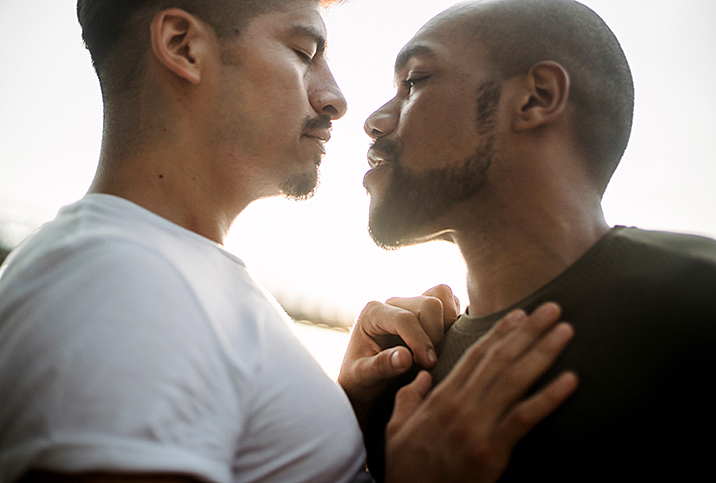How I Date With Herpes

When I was diagnosed with herpes simplex virus (HSV) at age 18, I thought my life was over. I saw no future for a romantic life, and the visions of the fairytale wedding I dreamt of faded away. Though I did eventually return to dating, I began having anxiety attacks when it was time to broach the subject of my status with a potential partner. It took years before I realized I was devaluing myself because of something that had involuntarily become a part of my life. I had to change my perspective in order to find a better approach.
Dating is rough these days, no matter your age, gender or sexual orientation. For someone with the herpes simplex virus, in my case, genital herpes (HSV-2), the experience can often be shrouded in anxiety and depression, emotions I've struggled with on and off for the better part of 27 years. Thanks to therapy, I've been able to develop strategies to help me deal with those feelings. However, preparing for the conversation, finding the right time to have it and anticipating a potential partner's rejection still takes fortitude, no matter the number of times you've done it.
HSV-2 in the United States
Herpes is probably more common than you think.
"According to the World Health Organization, they estimate about 491.5 million people were living with HSV-2 in 2016," said Sharee Clarke, a family nurse practitioner in Washington state who serves as CEO of BeyondMed Virtual Private Practice. "Between the ages of 14 and 49, that's about over 13 percent of the population."
Clearly, the herpes simplex virus, still very stigmatized, is common in the United States. Nearly 600,000 cases arise every year, according to the Centers for Disease Control and Prevention (CDC). Clarke emphasized that the virus doesn't always present in the textbook timeframe of 14 days. In fact, many people carry the virus for years without symptoms, if they ever see symptoms at all. She also shared that the virus is not routinely tested for unless there is a specific reason, which tends to leave asymptomatic carriers unaware. All these factors contribute to the high rate of transmission.
The best way to prepare for the conversation
Self-awareness is key when preparing to share your status with someone new.
"One of the biggest things that I tell people is to remember that you are not the virus," said Rendi Moore Carter, L.C.S.W., owner of Moore C2 (Moore Counseling and Coaching) in Georgia.
That sounds easy, but separating your identity from the virus can be difficult for some people. After first teaching yourself the virus does not define you, Carter's second piece of advice is to do your research, get educated and be prepared to answer questions. Third, make sure you're choosing a time and place that's conducive to the conversation and avoid framing it negatively. Instead of saying, "I've got bad news," tell the person you have a diagnosis of herpes simplex virus and ask if they understand what that means. Fourth, and finally, know that how the other person reacts is their decision, and be prepared for them to walk away.
Timing of the conversation
One of the most daunting parts of dating with an HSV-2 diagnosis is determining when you should share your status. Should that be shared before a date ever happens or when you anticipate sex is on the table? If you're really interested in a person, it can be scary to think they could make a snap decision based on the virus alone without really getting to know you. However, you want to be considerate of their time and their emotions, as well. If that's a dealbreaker for someone, you want to find out before anyone's heart gets broken.
Carter's advice is to allow the conversation to happen naturally, but have it as soon as possible. Many people offer their sexual health status or ask about getting tested together. This can be a great way for you to begin the conversation or address your status.
"The rules, I would say, to not have the conversation is after sex or right before sex," Carter said.
If the moment seems to be leading to sex and you haven't had the conversation, stop the interaction, slow things down and prepare to have the conversation at a later time. Give your potential partner the courtesy of making an informed decision about being with you.
Dealing with the outcome
Responses to your status disclosure can run the gamut from someone ghosting you to being totally willing to continue the relationship with proper safety measures in place. No matter how perfect the match, contracting the virus could potentially change someone else's life; some people are not going to be willing to take that risk, and that's OK.
Whether you've reentered the dating world or not after diagnosis, Clarke suggested the best way to deal with herpes is to lead a healthy lifestyle by eating a nutritious diet, taking care of your immune system and tending to your mental and emotional health.
In all my years of dating, only one person has had a bad reaction to my disclosure. Most people need a little time to process, so don't expect an answer immediately. Whatever the response, you can come out victorious over HSV-2. It does not have to consume your life.
*The author's name has been withheld at their request.




















